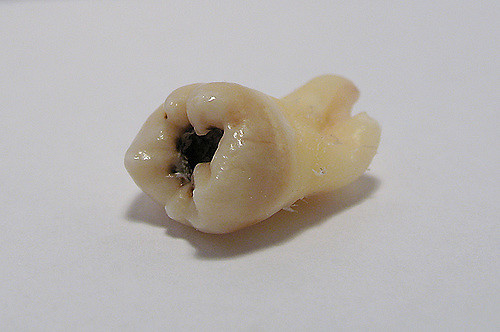Think you have a cavity? Cavities, or “dental caries” as they are professionally called, are often the first step toward more serious tooth decay. It’s no wonder dentists try to find them and take care of them, before they lead to more serious issues.
But how can you know if you have a cavity? And if you suspect that you have a cavity, what do you do?
Main Warning Signs of a Cavity
There are not always going to be clear signs that you have a cavity, but there are some things that should make you suspect something is wrong:
- Tooth sensitivity. Cavities occur where enamel has been eaten away, leaving the tooth root and/or nerves exposed. This can cause you to be extra sensitive to hot and cold, or even pressure.
- Tooth pain. Constant dull pain or sudden sharp pains: Any kind of dental pain means it’s time to see the dentist.
- Apparent divots, pits, or holes. You may notice these with your tongue, see them on your teeth in the mirror, or both. If you see them, they will likely have a black or brown color. Keep in mind, though, that cavities between your teeth or toward the back of your mouth won’t be visible; you’ll feel them before you see them.
- Bad breath or bad taste in your mouth. Cavities are caused by, and loaded with, bacteria. That bacteria produces all sorts of nasty stuff that can leave your breath foul smelling, even if you’ve brushed recently. A frequent bad taste can be present too.
How to Tell if Your Kid Has a Cavity
Many parents ask us whether their kids have cavities. All of the signs above are good indicators of cavities in kids, too.
That said, most kids are not good at communicating what’s going on in their mouths. So they might not tell you that a tooth hurts, or that they feel a hole, or even notice their bad breath. The best thing to do, then, is to take a look in their mouth if you suspect a cavity and look for the telltale signs: Pits or holes, brown or black color, bad breath, etc.
Small white spots can be a warning sign, too, as these indicate places where the enamel is wearing out. These areas will be prime candidates for cavities in the near future.
What might make you suspect a cavity in your child’s mouth?
- They complain about, avoid, or otherwise have a sensitivity to, hot and cold foods they normally enjoy (such as popsicles, hot or cold drinks, etc.).
- They complain about a toothache.
- You notice them chewing on one side of their mouth on more than one occasion (i.e., they are avoiding chewing on one side).
Cavity Detected: Next Steps
Let’s say you suspect that you or a loved one has a cavity. What do you do now?
1. Make an appointment. It will pay to have a professional dentist inspect your mouth to verify that you have a cavity. And who knows? There might be more than one! Best to have things checked out so that you catch all of the cavities at once. Your dentist can then recommend treatment. This might include fillings, crowns, pulp capping, or a root canal.
2. Manage the pain. Cavities can be painful, especially if they are far along. Over-the-counter pain medication, like ibuprofen, can help. Do your best to avoid contact with the cavity until you are able to see your dentist.
3. Start working to prevent future cavities. Fluoride helps strengthen enamel and prevent cavities. Most cities add fluoride to their water, but if you have frequent cavities, you might not be getting enough. Consider fluoride treatment. Also make sure you are brushing regularly, and eating sweet treats only in moderation.
4. Beware home remedies. There’s no lack of home remedies for cavities that you can find on the internet. Our dentists have heard them all: Cod liver oil and raw butter, vitamin D supplements, licorice root, salt water rinses, clove, turmeric, essential oils, and “remineralizing toothpastes.”
While these are not harmful, there is often little data to back up the claims that they help—just stories. You can try these home remedies to see what helps, but don’t let that be a substitute for seeing your dentist. Best case, your dentist declares you cavity free and gives you a good cleaning. Worst case, he or she will still be able to catch the cavity and take care of it in a timely manner.


